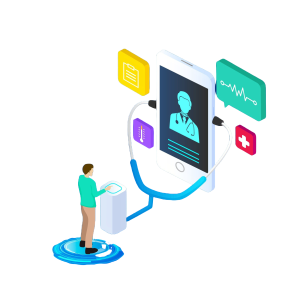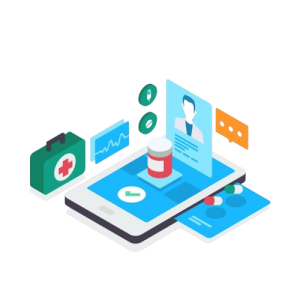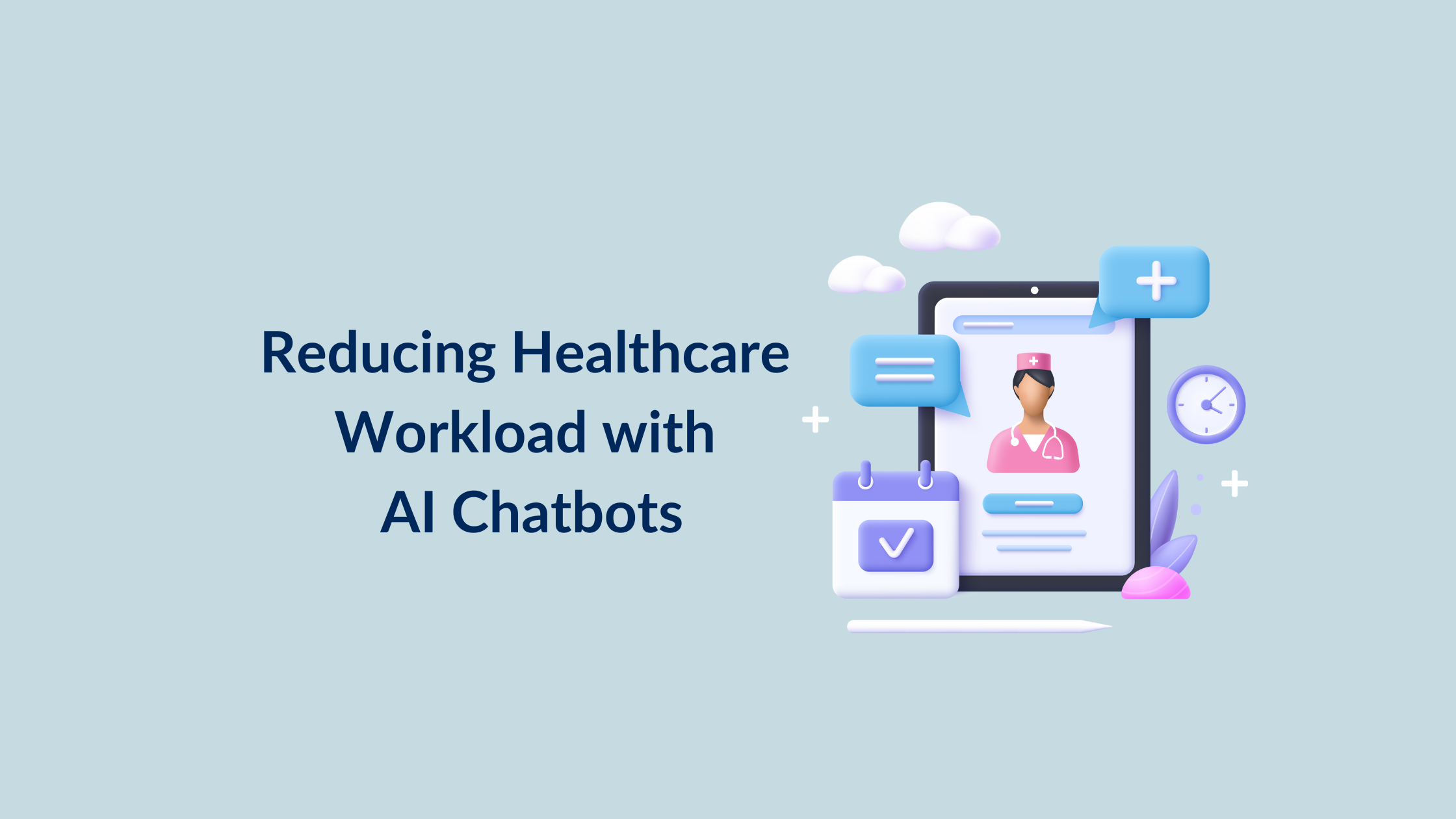Healthcare systems today face a growing strain from increasing patient demand, staff shortages, and the overwhelming administrative tasks that come with managing care. These challenges often lead to long wait times for patients, delays in scheduling appointments, and added stress for medical professionals trying to keep up.
AI chatbots are proving to be a practical solution to ease this burden. They handle routine tasks like answering common patient questions, scheduling appointments, and even guiding patients through symptom evaluation. By taking care of these activities, chatbots free up time for doctors and nurses to focus on providing quality care, while patients get faster responses and better access to services. This makes AI chatbots a valuable addition to the modern healthcare system.
Understanding AI Chatbots in Healthcare
AI chatbots are virtual assistants that interact with users to provide support and perform tasks. In healthcare, they help patients and medical staff by answering questions, scheduling appointments, and even offering health advice. These tools are designed to make communication faster and more effective, improving access to care.
AI chatbots work by using Natural Language Processing (NLP) and machine learning. NLP helps them understand and respond to human language in a natural way. Machine learning allows them to improve over time by learning from previous conversations, making their responses more accurate and personalized.
Healthcare organizations use AI chatbots for a variety of tasks, such as:
- Appointment Scheduling: Patients can book or change appointments without waiting on hold.
- Symptom Guidance: Chatbots assist patients in identifying potential health concerns and suggest next steps.
- Medication Reminders: They help patients stick to their prescribed treatments.
- Answering FAQs: Chatbots provide instant responses to common questions about services or health topics.
These examples show how AI chatbots make healthcare more accessible and reduce the workload for busy medical staff, helping both patients and providers in meaningful ways.

Benefits of AI Chatbots in Reducing Workload
AI chatbots are becoming an essential part of modern healthcare, offering practical solutions to reduce workload and improve efficiency. Here are some of the key ways they make a difference:
- Automating Repetitive Tasks
AI chatbots handle routine tasks like scheduling appointments, sending reminders, and managing follow-ups. By automating these processes, healthcare professionals can save time and focus on delivering quality care to their patients. - Enhancing Patient Engagement
With 24/7 availability, AI chatbots ensure patients can access customer support whenever they need it. Whether answering questions or guiding patients through simple processes, chatbots improve engagement and make healthcare more accessible. - Manage Administrative Burdens
Administrative tasks often overwhelm healthcare staff, from managing patient records to answering repetitive queries. AI chatbots take on these responsibilities, freeing up time for staff to concentrate on more critical tasks. - Providing Instant Access to Medical Information
AI chatbots offer patients quick answers to their health-related questions, such as understanding symptoms, medication usage, or hospital procedures. This instant access reduces the need for calls or visits for basic inquiries, improving the patient experience.
By addressing these areas, AI chatbots not only lighten the load for healthcare workers but also create a smoother and more responsive system for patients.
 Use Cases of AI Chatbots in Healthcare
Use Cases of AI Chatbots in Healthcare
AI chatbots play a practical role in simplifying healthcare processes and improving the experience for patients and providers. Here are some key ways they are being used:
- Appointment Scheduling
Booking or rescheduling appointments is quick and easy with chatbots. Patients can handle these tasks on their own, freeing up staff to focus on other responsibilities. - Symptom Checking
Chatbots guide patients through a simple evaluation of their symptoms. Based on the information provided, they suggest whether the patient should seek care and what steps to take next. - Medication Reminders
Chatbots help patients stay on track with their medications by sending reminders at the right time. This ensures treatments are followed properly and consistently. - Patient Triage
Before a patient sees a doctor, chatbots can gather important details about their symptoms and needs. This helps prioritize urgent cases and streamlines care for both patients and providers. - FAQs and Support
Patients often have questions about hospital services, policies, or general health concerns. Chatbots provide instant answers, reducing wait times and keeping support staff available for more complex needs.
These practical uses of AI chatbots make healthcare more efficient, helping patients get the support they need while easing the workload for medical teams.
Impact on Healthcare Professionals
AI is reshaping healthcare by automating repetitive tasks and improving operational efficiency. It assists doctors and nurses by managing routine inquiries and administrative responsibilities, allowing them to prioritize patient care.
By minimizing these time-consuming duties, AI helps reduce work-related stress and fatigue among healthcare professionals, contributing to improved well-being and productivity.
Furthermore, AI facilitates better communication between patients and providers. Automated systems handle appointment scheduling, send reminders, and provide updates, ensuring smoother coordination and improved patient experience.
While the benefits are significant, implementing AI in healthcare comes with challenges, such as training staff, ensuring data privacy, and maintaining trust in AI-driven processes. Addressing these concerns will ensure the technology continues to support healthcare teams in delivering effective, patient-centered care.
Challenges and Considerations
While AI chatbots bring many benefits to healthcare, there are important challenges that need attention to ensure their effective use. Here are some key considerations:
- Data Security and Patient Privacy
Healthcare involves sensitive information, and protecting patient data is critical. AI chatbots must comply with strict privacy regulations like HIPAA to ensure that all interactions are secure. Organizations need to invest in robust security measures to prevent data breaches. - Accuracy and Reliability of Responses
Patients rely on chatbot responses for health-related questions and guidance. Inaccurate or incomplete information can lead to confusion or harm. It’s essential to regularly update and test chatbots to ensure they provide accurate and reliable answers. - Resistance to AI Adoption
Some healthcare providers and patients may hesitate to trust AI technology. Concerns about replacing human interaction or relying on technology for critical decisions can slow adoption. Building awareness about how chatbots support—not replace—healthcare professionals is key to overcoming this resistance.
By addressing these challenges, healthcare organizations can ensure that AI chatbots are both effective and trustworthy, benefiting patients and providers alike.
Future of AI Chatbots in Healthcare
AI chatbots are transforming the future of healthcare by incorporating advanced features that streamline processes and enhance patient care. Here’s how they are making a difference:
Integration with Electronic Health Records (EHRs)
AI chatbots are increasingly capable of integrating with EHR systems, enabling real-time access and updates to patient records. This streamlines tasks such as scheduling, reviewing medical histories, and providing personalized care recommendations, reducing the manual workload for healthcare professionals.
Expanding Capabilities with Advanced AI Models
As AI models evolve, chatbots are handling more complex tasks like symptom analysis, health advice, and triage support. These improvements make chatbots more reliable and effective across various healthcare applications.
Role in Telemedicine and Personalized Patient Care
AI chatbots are becoming integral to telemedicine by supporting virtual consultations and offering personalized guidance. They assist in collecting patient information and ensuring that care delivery is more efficient and accessible.
Conclusion
Healthcare systems face increasing challenges, including rising patient demand, staff shortages, and administrative burdens. YourGPT Chatbot offers a practical solution by integrating with electronic health records (EHRs) to streamline scheduling, medical history reviews, and patient care coordination. Its AI capabilities assist with symptom analysis, triage, and patient guidance, providing timely and accurate support around the clock. With multilingual functionality, it ensures accessibility for diverse populations.
By automating routine tasks and responding to common inquiries, YourGPT Chatbot enables healthcare professionals to focus on delivering care. This tool reduces staff workloads, improves operational efficiency, and enhances the patient experience, supporting better outcomes for modern healthcare systems.
FAQs
Which technologies allow AI chatbots to work effectively?
AI chatbots use Natural Language Processing (NLP) to interpret and respond to human language, while Machine Learning (ML) allows them to improve over time by learning from previous interactions.
Can AI chatbots give appropriate medical advice?
AI chatbots give symptom guidance and basic health advice, but they are not a replacement for professional medical consultations. They improve healthcare services by providing initial guidance and referring patients to the appropriate treatment.
Which administrative functions may AI chatbots perform in healthcare?
AI chatbots improve operations by scheduling appointments, giving medicine reminders, answering FAQs, and collecting patient data. This automation reduces staff work and increases efficiency.
How do AI chatbots directly benefit patients?
Patients get faster responses, easy access to healthcare services, timely medications reminders, and precise information about symptoms and treatments. Chatbots streamline processes, which improves the entire experience.
Do AI chatbots support various languages?
Yes, AI-powered chatbots, like YourGPT Chatbot, can support multiple languages. This makes sure that different groups have access to healthcare services.


Leave a Reply